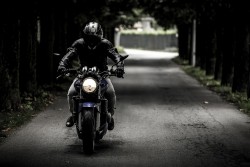Throttling up crime: crawling social media to understand outlaw motorcycle gangs’ dynamics
Understanding and isolating the factors in the recruitment to organised crime and terrorist networks is the ambitious mission of the PROTON project. The first step in this three-year-long venture is, of course, to investigate what we already know about those processes: that’s what Dr. Stefan Rilling has been working on for the first project year, with his team at Fraunhofer Institute for Intelligent Analysis and Information Systems (IAIS). His research is specifically focused on the use of social media by motorcycle gangs in Europe. His team analyses the information that can be gathered from social networks through data science with a two-fold objective: obtaining meaningful insights into gangs’ behaviour and producing parameters that can be afterwards fed into the project’s main activity - the ABM simulations. To begin with, why are motorcycle gangs so important? Are they a big reality in Europe? Outlaw motorcycle gangs are a common phenomenon in Europe and subject to policing in a multitude of Member States. In Germany alone, about 20 clubs were forbidden in the last 10 years as a consequence of their association with criminal organisations. We chose to focus on them also due to their large presence in social media and their frequent activity. Moreover, according to the information provided by Law Enforcement Agencies, (like BKA in Germany), outlaw motorcycle gangs show various connections to organised crime groups, mainly in the field of drug trafficking, violations of weapon law and violent crime. How did the team gather information from social media? In order to retrieve data from social networks, we developed a crawling software, a system based on the principles of distributed web applications and relational database management systems. The quantitative data on presence and frequency of content generation will later be used as a parameter for the ABM simulation. This may be combined with the knowledge regarding the social media usage of organised crime that has been developed within the project by the Transcrime research center of Università Cattolica del Sacro Cuore, the coordinator of PROTON. Results are still preliminary at the moment, but are there significant outcomes yet? Up until now, we were able to assess quantitatively the Facebook presence of the European dependencies of the outlaw motorcycle clubs, Hell’s Angels and Bandidos MC, using the web crawling and analysis system. For us, it was surprising to see a relatively small portion of the clubs maintaining a Facebook presence (15% of the Hell’s Angels clubs and 25% of the Bandidos clubs). As a next step, we are also evaluating an approach to analyse the content provided on the Facebook pages at a semantic level. But with privacy issues being encountered regularly in this direction, research on it needs to be carefully planned according to the relevant regulations.
Countries
Germany, Italy



